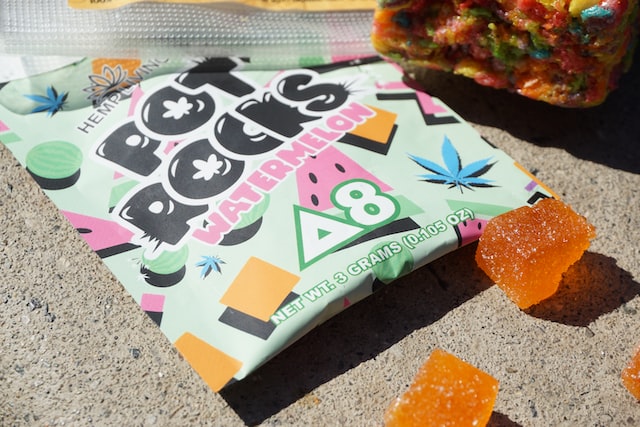Buying edibles containing delta-8 THC is an excellent way to get the therapeutic benefits of THC without the hassle of smoking or vaping. However, some crucial points must be remembered before making the final decision.
Contents
Research on Delta-8-THC is Scarce
Using Delta-8 THC like Delta-8 THC edibles for medicinal purposes is a relatively new practice. Although the National Cancer Institute has approved the cannabinoid as an “anxiolytic,” little research supports this claim.
The FDA has issued warnings against using delta-8 products. These products have been reported to contain dangerous ingredients, such as heavy metals and bleaches.
However, many unregulated cannabis products have no regulations on ingredients or production. This lack of oversight can cause dangers outside of a dispensary.
Delta-8 THC has been reported to cause cognitive and behavioral changes, though the extent of these effects is unknown. Delta-8 is also known to interact with the body similarly to delta-9 THC. This makes it a potential treatment for neurological diseases such as Alzheimer’s.
The CDC has also issued warnings about delta-8 products. They recommend using products that are approved for medical use.
The delta-8-THC craze began when the price of CBD plummeted. As a result, many producers looked for ways to turn this glut of CBD into something more profitable.
Researchers have found that delta-8 THC is effective at relieving pain and anxiety. Users also report mild euphoria, happiness, and relaxation. However, there are also reports of short-term and long-term side effects. For example, some users say a heightened sense of time, paranoia, and difficulty concentrating.
There are also a few reports of people experiencing long-term effects from delta-8 THC, including behavioral addiction. These reports are still being evaluated, and further research is needed to determine the long-term impact of delta-8 THC.
There is also limited research on delta-8 THC’s ability to combat inflammation and neuropathic pain. Although this is the most famous cannabinoid, research on delta-8 THC’s other effects is scarce.
The delta-8-THC ‘craze’ is now spreading across the US. Products are being sold in candy forms, gummies, and vapes.
Manufacturing of Delta-8-THC Products May Lead to Unsafe Contaminants
Despite the widespread use of delta-8-THC in e-cigarettes, gummies, and edibles, there are no standards to protect consumers from contaminants. As a result, these products can be contaminated with chemicals, pesticides, and heavy metals, which may be hazardous to health.
Some of these contaminants are unintended byproducts of the extraction process, which can be dangerous to human health. They include heavy metals, bleaches, chemicals, and pesticides.
In addition to potential contaminants, delta-8 THC products may also be mislabeled, which can lead to unexpected effects. Some products sold as delta-8-THC contain other cannabinoids, such as delta-9-THC.
In the last year, more and more delta-8 THC products have become available. These products may include gummies, tinctures, e-cigarette cartridges, and edibles. However, these products are not regulated by the FDA or state regulatory agencies, and the consumer is not protected.
According to a recent University of Rochester Medical Center report, 27 delta-8-THC products were tested for contaminants. All of the products tested contained dangerous byproducts such as heavy metals and pesticides.
These products were sold to consumers in states that do not allow the sale of adult-use cannabis. The most common adverse event reports were vomiting, hallucinations, and confusion. Most of the exposures involved people in the age group of children. Another 39% involved adults. Over one-third of the directions required hospitalization.
Most delta-8 products did not contain the amount of delta-8 THC advertised on the label. However, according to the CDC, the National Syndromic Surveillance Program has recorded over 2,000 calls related to delta-8. In addition, the FDA has warned consumers about delta-8-THC products.
Some states have banned delta-8 THC products, including Oregon and New York. In addition, the FDA issued warning letters to manufacturers selling Delta-8 THC products.
While the FDA is concerned about the proliferation of delta-8 THC products, they do not have any specific safety standards.
Dosage of Delta 8 THC
Getting the proper dose of Delta 8 THC is essential to experience its full benefits. Fortunately, there are several ways to do it. The best way is to start small and increase your dosage in small increments.
For starters, try a quarter of an edible. If you are under 130 pounds, you should start with a half-dose. Then, once you have built up a tolerance, you can go up to the total dosage.
A gummy is also a good choice for your first dose. It is the easiest to take and is a faster-acting method. You can even break or chew it to adjust your dosage.
However, you will have to wait at least an hour to feel any real effects. You may also experience mild paranoia or tiredness. It would help if you also drank plenty of water.
To enjoy Delta 8’s full effects, you should try smoking or vaping. The results of the vaporized Delta 8 THC last up to five hours. So using this method is the fastest way to get high.
You can also take Delta 8 as a tincture or oil. These are usually glass bottles with dropper lids. Each dropper holds one milliliter of the mixture. It contains about 20 milligrams of Delta 8 THC.
Delta 8 THC is relatively new to the market. There have been no long-term studies to determine its long-term effects. Fortunately, it is a legal recreational drug. Therefore, it is not listed in the new farm bill.
However, it’s essential to know that delta 8 THC is a cannabinoid, so taking too much of it’s not a good idea. Overdosing can produce unpleasant effects, like vomiting. If you find yourself experiencing any of these side effects, stop using the product for a while.




